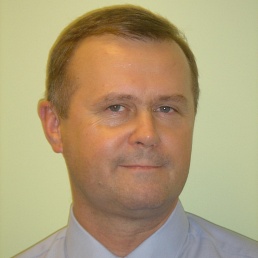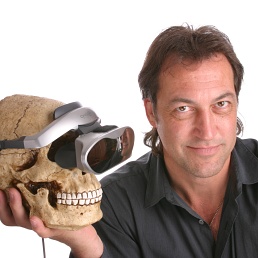Without a doubt, Virtual Reality is the main technology currently used by psychologists, including both, therapists and researchers. VR enables people to enter a completely different world for a while, and experience certain stimuli in a safe and controlled environment. Virtual Reality applications have been helping patients suffering from anxiety, phobias, Post Traumatic Stress Disorder (PTSD), depression, autism, and addictions, for some time now.
The upcoming event in the HumanTech Meetings series, organized by SWPS University’s HumanTech Center for Social and Technological Innovation will explain how Virtual Reality impacts changes in behavior, emotions, and attitudes of people who decide to enter the world of illusion. Our Key Note Speaker, Professor Skip Rizzo, a renowned researcher in the field of the VR technology, Director of Medical VR at the University of Southern California Institute for Creative Technologies, in the United States, will talk about the applications of VR in therapy of various psychological and medical disorders, such as phobias, trauma, pain and anxiety. Our speakers from Poland, Wojciech and Jakub Kreft, from Unicorn VR World, will present VR applications in entertainment, education and therapy.
The meeting will be hosted by Dr. Konrad Maj.
Due to the pandemic, the meeting will take a form of an online webinar.
Lanuages of the event: Polish and English (with translation to both languages).
Registration required.
Follow the link to the live event »
October 19
17:00 CEST (GMT+2)
online
HumanTech Meetings
We live in an era of innovation, technological progress and digitalization. This current innovation drive may lead to unpredictable psychological and social outcomes. Therefore, it is crucial to establish collaborations between engineers, programmers, IT specialists and social scientists during initial phases of any new projects related to development of new technologies or services. Such collaborations may help to avoid mistakes and can support better development of new ideas.
The project is planned as a series of meetings, gathering academics and professionals from the technology sector from Poland and other countries. Each meeting will include two lectures, one delivered by a speaker from Poland and one presented by a guest from another country. The lectures will be followed by panel discussions, where panelists will represent different approaches to innovation and technology.
HumanTech Meetings is a project of SWPS University's Center for Innovation. The aim of the project is to initiate cooperation between the technology sector and social scientists to present different perspectives on phenomena such as Artificial Intelligence, machine learning, algorithms, robotics as well as virtual and augmented reality.
More information »
Lectures
Lecture 1: VR Challenges – Virtual Spaces for Fun, Education and Therapy (in Polish with translation to English)
The only way to fully experience and understand the potential and possibilities offered by the Virtual Reality (VR) technology is “empirical verification”, i.e. putting on good quality VR goggles and seeing for oneself how VR works. Unfortunately it cannot be done online. Instead, the speakers will present the theoretical background, including the latest research, and possible practical applications of VR and the breadth of possibilities that this technology brings to entertainment, education, and therapy.
A specially designed computer program may not only take on a role of an endlessly patient teacher (or a therapist), who supports children in a comprehensive competence development, but also it may monitor and record child’s progress, and importantly, it may align the program with the child’s individual developmental needs. It can offer personalized therapy and education plans.
VR provides a great opportunity to bring together technology and social sciences. At the same time, it is a real challenge for creativity, because it allows you to create nearly everything that one can think of, and use it for entertainment, education and therapy, and preferably for all three purposes simultaneously. Providing education and therapy through play has become possible as never before.
Follow the link to the live event »
Jakub Kreft – is a cofounder and CEO of Unicorn VR World. He is also a computer programmer specializing in VR and mobile applications. Jakub developed three innovative mobile applications for the “Social Innovations” program and created Puzzle Kariery (Career Puzzle), the first mobile application for career planning in Poland. As a member of the Warsaw University of Technology’s Racing Team Research Club, he developed an autonomous racing robot. Jakub also coordinated Robomaticon 2017, the largest robot competition in Poland. He is the Chair of the Automatic Control and Robotics Research Club at the Warsaw University of Technology and was a speaker at the 2017 TEDxWarsaw conference. He participated in the PFR School of Pioneers, an international educational program supporting future tech entrepreneurs and visionaries, where his project, Unicorn VR World, won the main prize at the 2020 PFR School of Pioneers Gala. More information at www.linkedin.com/in/jakub-kreft-5a48b641.

Wojciech Kreft – is a cofounder and COO at Unicorn VR World. He is also a psychologist, career consultant, coach, e-coach, and a university lecturer at the University of Economics and Human Sciences in Warsaw (currently teaching classes in “E-therapy: application of ICT in psychological therapy”). Wojciech is an innovator who applies new digital technologies to the development of personal development tools. In this role, he has developed numerous innovative tools and computer programs for career advising and education. He is an initiator of the innovative network of Mobile Centers for Job Information (OHP) and School Career Centers (SzOK). Furthermore, he is a member of the European Commission Expert Group on Lifelong Guidance. Wojciech authored many reports and analysis papers on career counselling and the job market for institutions such as the Organization for Economic Co-operation and Development (OECD), the World Bank, and the European Commission. More information at: Digital CV - http://bit.ly/wojtek14 and www.linkedin.com/in/wkreft.
Lecture 2: Is Clinical Virtual Reality Ready for Primetime? (in English)
Since the mid-1990s, a significant scientific literature has evolved regarding the outcomes from the use of what we now refer to as Clinical Virtual Reality (VR). This use of VR simulation technology has produced encouraging results when applied to address cognitive, psychological, motor, and functional impairments across a wide range of clinical health conditions. This presentation addresses the question, “Is Clinical VR Ready for Primetime?” After a brief description of the various forms of VR technology, I will discuss the trajectory of Clinical VR over the last 20 years and summarize the basic assets that VR offers for creating clinical applications. The discussion then addresses the question of readiness in terms of the theoretical basis for Clinical VR assets, the research to date, the pragmatic factors regarding availability, usability, and costs of Clinical VR content/systems. This will be presented in the context of descriptions and video examples of applications addressing Anxiety Disorders, PTSD, Addiction, Depression, PTSD, Pain Management, Stroke, TBI, ADHD, Autism, and Virtual Human applications for clinical training and patient facing healthcare support. Ethical issues for the safe use of VR with clinical populations will then be detailed. While there is still much research needed to advance the science in this area, I will make the case that Clinical VR applications are in fact “ready for primetime” and will soon become indispensable tools in the toolbox of healthcare researchers and practitioners and will grow in relevance and popularity in the near future as the technology continues to evolve.
Follow the link to the live event »

Prof. Skip Rizzo – is a clinical psychologist and Director of Medical VR at the University of Southern California Institute for Creative Technologies. He is also a Research Professor with the USC Dept. of Psychiatry and School of Gerontology. Over the last 25 years, Skip has conducted research on the design, development and evaluation of Virtual Reality systems targeting the areas of clinical assessment, treatment, and rehabilitation across the domains of psychological, cognitive and motor functioning in both healthy and clinical populations. This work has focused on PTSD, TBI, Autism, ADHD, Alzheimer’s disease, stroke and other clinical conditions. In spite of the diversity of these clinical R&D areas, the common thread that drives all of his work with digital technologies involves the study of how Virtual Reality simulations can be usefully applied to human healthcare beyond what’s possible with traditional 20th Century methods. To view some videos on his work, go to: https://www.youtube.com/user/albertskiprizzo
Panellists
Ewelina Smoktunowicz, Ph.D. – is an occupational health psychologist that specializes in implementing technology in psychological practice. She is the leader of StressLab: Stress Research Centre at SWPS University of Social Sciences and Humanities. Her work focuses primarily on developing, verifying and implementing internet interventions that aim to improve mental health at work. She led the team that created internet programs Med-Stress and Med-Stress SOS, both dedicated to medical professionals. She also co-created a VR-based intervention aimed at reducing fear of heights. Ewelina obtained her doctoral degree from SWPS University of Social Sciences and Humanities and completed a postdoctoral scholarship at Stockholm University.
Iwona Pomianowska, Ph.D. – is an information and audiovisual designer, a lecturer at the Warsaw University (Psychology Department) and at The Schiller National Film School (Postproduction & New Media). As a member of the museum advisory committee (M Museum Leuven) she combines the domains of empirical psychology and media design by scrutinizing the issues of human cognition, visual perception (PhD, the School of Psychology, Trinity College Dublin) and the information design (LUCA School of Arts, Brussels).
Elżbieta Włodarska – is Vice-President of BioMinds Healthcare, psychologist, and neuropsychologist. She has 16 years of clinical experience in working with adults, who suffered a brain damage. She specializes in diagnosis of dementia syndromes as well as neuropsychological therapy of cognitive functions in post craniocerebral injuries and stroke patients, who are in a minimal conscious state. Elżbieta is also a co-founder and coordinator of Origin MemoryCare and Origin NeuroCare, therapeutic programs for people with diminished cognitive and motor functions, allowing the patients to stay active and independent as long as possible. She is a member of the Polish Alzheimer Society and the Polish Neurological Society.
Meeting Host
Konrad Maj, Ph.D. – Social psychologist, Head of the HumanTech Meetings project, initiator and Head of the HumanTech Center for Social and Technological Innovations. In his research and teaching he focuses on social influence, media psychology and innovations. Recently, he has been working on a Human-Robot-Interaction (HRI) project. From 2013 to 2016 he held the post of Rector’s Representative for Research, focusing on practical application of research results and social innovations. He visited numerous innovation centers, including the Institute for Social Innovation (ISI) at Carnegie Mellon University, Pittsburgh, USA, the ID+ Research Institute for Design, Media and Culture at the University of Averio, Portugal, and Design Factory at Aalto University, in Finland.
Organizer
HumanTech Center for Social and Technological Innovation >>
Partners

Media Support

Sponsors

Date and Location
Wednesday, December 11, 2019, room S303
SWPS University
Chodakowska 19/31
03-815 Warsaw
Contact
Coordinator: Ewa Łuczak
e-mail: This email address is being protected from spambots. You need JavaScript enabled to view it.
Marketing and PR:
Dominika Wawrzyniak
e-mail: This email address is being protected from spambots. You need JavaScript enabled to view it.
Magdalena Chorzęp
e-mail: This email address is being protected from spambots. You need JavaScript enabled to view it.
The HumanTech Meetings project is funded by the Ministry of Science and Higher Education, under the “Promotion of Science” funding scheme - contract no. 792/P-DUN/2019.